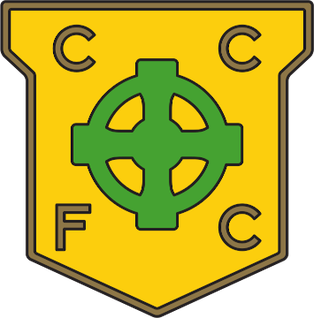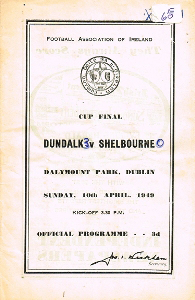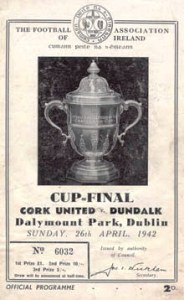Notable former players
Ireland (FAI) internationals
Ireland (IFA) internationals
England internationals
Scotland internationals
Other sports
-
 Noel Cantwell – played cricket for Ireland
Noel Cantwell – played cricket for Ireland -
 Ned Courtney – played Gaelic football for Cork
Ned Courtney – played Gaelic football for Cork
| Full name | Cork Athletic Football Club |
|---|---|
| Founded | 1948 |
| Dissolved | 1957 |
| Ground | The Mardyke Cork |
| League | League of Ireland |
Cork Athletic Football Club was a Irish football club based in Cork. They played in the League of Ireland between 1948 and 1957. They were the successor club of Cork United. When United quit the league in October 1948, Cork Athletic was immediately formed to take their place. [1] Athletic won the league in 1950 and only lost the cup final against Transport after two replays. The following year they won a league and FAI Cup double after beating Shelbourne in a replay to win the cup. In 1953 they won the first all-Cork FAI Cup final, beating Evergreen United 2–1. Athletic also began the Cork tradition of fielding veteran English League players by recruiting Sunderland legend Raich Carter. The club eventually folded in 1957, due to financial problems. [2] They were replaced in the League by Cork Hibernians. [3] [4]
| Season | Position |
|---|---|
| 1956–57 | 8th |
| 1955–56 | 9th |
| 1954–55 | 5th |
| 1953–54 | 4th |
| 1952–53 | 8th |
| 1951–52 | 10th |
| 1950–51 | 1st |
| 1949–50 | 1st |
| 1948–49 | 9th |

Noel Euchuria Cornelius Cantwell was an Irish footballer player and sometime cricketer.
Cork Hibernians F.C. was an Irish football club based in Cork. They played in the League of Ireland between 1957 and 1976 and, from 1962, played their home games at Flower Lodge. In 1971, they were League of Ireland champions.

Cork Celtic F.C., originally Evergreen United F.C., was an Irish football club based in Cork. They played in the League of Ireland between 1951 and 1979 and played their home games at Turners Cross. In 1974, they were League of Ireland champions and the following season they reached the second round of the European Cup.
Cork United Football Club was a League of Ireland club based in Cork from 1940 until 1948.
Cork Football Club was an Irish association football club based in Cork. They were founded as Fords F.C. and later became known as Fordsons F.C.. They played in the League of Ireland between 1924–25 and 1937–38. Like several fellow early League of Ireland clubs, such as St James's Gate, Jacobs, Midland Athletic and Dundalk, the club had their origins as a factory or works team. They were initially the football team of the Ford Motor Company, a major employer in the city at the time. In 1930, however, Ford ended its association with the club and they were renamed Cork. The club folded in 1938 and were replaced in the League of Ireland by a new club, Cork City.

The Football Association of Ireland is the governing body for association football in the Republic of Ireland.
Owen Madden was an Irish footballer who played as a forward in the League of Ireland and the English Football League. Madden was a dual international who played for both Ireland teams – the FAI XI and the IFA XI.
Ned Courtney was an Irish footballer who played Gaelic football for Cork GAA and association football for Cork United, Cork Athletic and Ireland. Courtney, who played as a goalkeeper in both codes, was originally from Dublin and was a captain in the Irish Army. He won a Munster Senior Football Championship with Cork GAA before going onto win three League of Ireland titles. Between 1950–51 and 1952–53 he also played in three successive FAI Cup finals.

The Mardyke, also referred as the Mardyke Sports Ground, is the main sports campus of University College Cork (UCC), located at the western end of the Mardyke area near Cork city centre. The grounds and fitness facilities used by sports team representing, the general student body, and members of the public. Outdoors, there are floodlit grass and all-weather pitches, used for soccer, rugby union, Gaelic games, and hockey. Kayakers train in the adjacent North channel of the River Lee. There is a tartan track for athletics, where the Cork City Sports are held annually. The most notable performance came in the hammer throw on 3 July 1984, when the world record was broken six times in one evening by Yuriy Sedykh and Sergey Litvinov.

The 1981 FAI Cup Final was the final match of the 1980–81 FAI Cup, a knock-out association football competition contested annually by clubs affiliated with the Football Association of Ireland. It took place on Sunday 26 April 1981 at Dalymount Park in Dublin, and was contested by Dundalk and Sligo Rovers. The competition was sponsored by Mitre. Dundalk won the match 2–0 to win the cup for the seventh time.

The 1977 FAI Cup Final was the final match of the 1976–77 FAI Cup, a knock-out association football competition contested annually by clubs affiliated with the Football Association of Ireland. It took place on Sunday 1 May 1977 at Dalymount Park in Dublin, and was contested by Dundalk and Limerick. Dundalk won 2–0 to win the cup for the fifth time.

The 1979 FAI Cup Final was the final match of the 1978–79 FAI Cup, a knock-out association football competition contested annually by clubs affiliated with the Football Association of Ireland. It took place on Sunday 22 April 1979 at Dalymount Park in Dublin, and was contested by Dundalk and Waterford. The competition was sponsored by Mitre. Dundalk won the match 2–0 to win the cup for the sixth time, and, in so doing, won their first League and Cup Double.

The 1958 FAI Cup Final was the final match of the 1957–58 FAI Cup, a knock-out association football competition contested annually by clubs affiliated with the Football Association of Ireland. It took place on Sunday 20 April 1958 at Dalymount Park in Dublin, and was contested by Dundalk and Shamrock Rovers. Dundalk won 1–0 to win their fourth FAI Cup.

The 1952 FAI Cup Final was the final match of the 1951–52 FAI Cup, a knock-out association football competition contested annually by clubs affiliated with the Football Association of Ireland. It took place on Sunday 20 April 1952 at Dalymount Park in Dublin, and was contested by Cork Athletic and Dundalk. The match finished 1–1, sending the final to a replay the following Wednesday 23 April 1952. Dundalk won the replay 3–0 to win their third FAI Cup.

The 1949 FAI Cup Final was the final match of the 1948–49 FAI Cup, a knock-out association football competition contested annually by clubs affiliated with the Football Association of Ireland. It took place on Sunday 10 April 1949 at Dalymount Park in Dublin, and was contested by Dundalk and Shelbourne. Dundalk won 3–0 to win their second FAI Cup.

The 1942 FAI Cup Final was the final match of the 1941–42 FAI Cup, a knock-out association football competition contested annually by clubs affiliated with the Football Association of Ireland. It took place on Sunday 26 April 1942 at Dalymount Park in Dublin, and was contested by Dundalk and Cork United. Dundalk won 3–1 to win their first FAI Cup.
Dundalk entered the 1981–82 season, having finished as runners-up to Athlone Town the previous season. They were the holders of both the League Cup and the FAI Cup, having achieved their first domestic cup double. In the process, they had qualified for the Cup Winners' Cup. 1981–82 was Jim McLaughlin's eighth season as manager, and was Dundalk's 56th consecutive season in the top tier of Irish football.
Dundalk entered the 1978–79 season, having won the previous season's League Cup and Leinster Senior Cup. But they had finished in a disappointing 11th place in the League, which meant there would be no European football in the new season. 1978–79 was Jim McLaughlin's fifth season as manager, and was Dundalk's 53rd consecutive season in the top tier of Irish football.

Dundalk entered the 1966–67 season on the back of a disappointing eighth-place finish in the League and a sixth-place finish in the Shield the previous season. 1966–67 was Alan Fox's first season as player-coach, having been appointed by the club's new board of directors in August. It was Dundalk's 41st consecutive season in the top tier of Irish football.
Dundalk entered the 1932–33 season on the back of a fourth-place finish in the League and a fifth-place finish in the Shield the previous season. 1932–33 was manager Steve Wright's third season at the club, and was Dundalk's 7th consecutive season in the top tier of Irish football. Home matches were played at the Dundalk Athletic Grounds.